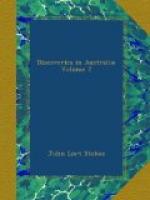Our stay in the Derwent, during which land and seabreezes prevailed, afforded me an opportunity of comparing our compasses at the magnetic observatory, established since our last visit by the Antarctic expedition, and left in charge of Lieutenant Key and Messrs. Dayman and Scott, officers belonging to it. This place His Excellency, who took part in the observations made there, named after the leader of the expedition, Ross Bank Observatory: I found it to be 20 seconds west, and 1 minute 10 seconds, north of the Beagle’s observation spot in Fort Mulgrave.
Sir John Franklin, who has always taken great interest in the Beagle’s voyage, testified every wish to afford me assistance: and in the most liberal manner placed at my disposal the colonial cutter, Vansittart, to assist in the survey of the Strait. Messrs. Forsyth and Pascoe were selected for the service, the former being in command. After giving the Vansittart a slight refit, and a few alterations which were expedited in a most praiseworthy manner by Captain Booth, commandant at Port Arthur, she was to proceed to the scene of operations near Banks Strait. In the meantime the Beagle sailed for Sydney to receive the stores we expected from England.
ATMOSPHERIC CHANGES.
March 10.
This was our second day from the Derwent; but owing to the prevalence of North-East winds we had not made further progress than to be at noon, thirty miles east from Cape Pillar. The atmospheric changes during this day were curious. The morning broke hazy, with a moderate breeze from North-North-East, which gradually subsiding and veering at the same time to East-South-East, left us becalmed for three or four hours; thick impenetrable fogs meanwhile passed at intervals to the South-West; and whenever this obstruction to our vision was removed, could be seen a dark heap of clouds collecting, some of which detaching themselves passed rapidly over our heads. About three P.M. there was the sighing of a breeze from that quarter. The barometer, also, at this time, ceased falling and stood at 29.57, being as much as two-tenths lower than what it was an hour before, and having fallen since eight A.M. four-tenths.
The rapid depression of the mercury was quite perceptible to the eye. Under reduced sail the ship, like the petrel with closed wing, waited the coming blast. A dense fog enveloped us; but an hour after the barometer had ceased falling, it lifted up and revealed a long sheet of hissing foam crowning the troubled waters that were rolling, urged by the tempest, tumultuously towards us from the south-west.
RETURN TO SYDNEY.
For a while the heavy reduced canvas still flapped with a lazy swag against the masts; but suddenly it was filled by a violent gust; and the Beagle was hurried swiftly onwards, careering over the waves like the misty spectre in a storm. Two hours after (six P.M.) the barometer had risen a tenth. We now expected our passage to Sydney to be short: but the ill luck of foul winds again attending us, it was the fifteenth before we arrived.




